
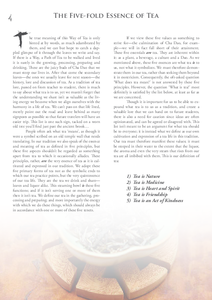 |
|
The true meaning of this Way of Tea is only hinted at by words, as much adumbrated by them, and we can but hope to catch a dappled glimpse of it through the leaves we write and say. If there is a Way, a Path of Tea to be walked and lived it is surely in the growing, processing, preparing and drinking. These are the juicy buds of Cha Dao that we must steep our lives in. After that come the secondary leaves - the ones we usually leave for next season - the history, lore and discussion of tea. As a tradition of tea lore, passed on from teacher to student, there is much to say about what tea is to us, yet we mustn't forget that the understanding we share isn't as valuable as the living energy we become when we align ourselves with the harmony in a life of tea. We can't pass on that life lived, merely point out the road and leave behind as many signposts as possible so that future travelers will have an easier trip. This list is one such sign, tacked on a worn old tree you'll find just past the ancient brook...
People often ask what tea 'means', as though it were a symbol scribed on an old temple wall that needs translating. In our tradition we also speak of the essence and meaning of tea as defined in five principles, but these five aspects shouldn't be regarded as something apart from tea to which it occasionally alludes. These principles, rather, are the very essence of tea as it is cultivated and expressed in our tradition. We adopt these five primary forms of tea not as the symbolic ends to which our tea practice points, but the very quintessence of our tea life. They are the tea we drink and share - leaves and liquor alike. This steaming bowl is these five functions; and if it isn't serving one or more of them then it isn't tea. We define our tea in the gathering, processing and preparing; and more importantly the energy with which we do these things, which should always be in accordance with one or more of these five tenets.
If we view these five values as something to strive for - the culmination of Cha Dao, for example - we will in fact fall short of their attainment. These five essentials are tea. They are inherent within it: as a plant, a beverage, a culture and a Dao. As we mentioned above, these five essences are what tea is to us, not what it symbolizes. We must therefore demonstrate them in our tea, rather than seeking them beyond it in esotericism. Consequently, the oft-asked question 'What does tea mean?' is not answered by these five principles. However, the question 'What is tea?' most definitely is satisfied by the list below, at least as far as we are concerned.
Though it is important for us to be able to expound what tea is to us as a tradition, and create a valuable lore that we can hand on to future students, there is also a need for caution since ideas are often opinionated, and can be agreed or disagreed with. This list isn't meant to be an argument for what tea should be to everyone; it is instead what we define as our own cultivation and expression of a tea life in this tradition. Our tea must therefore manifest these values; it must be steeped in their water to the extent that the liquor, the aroma and even the very steam that rises from our tea are all imbibed with them. This is our definition of tea:
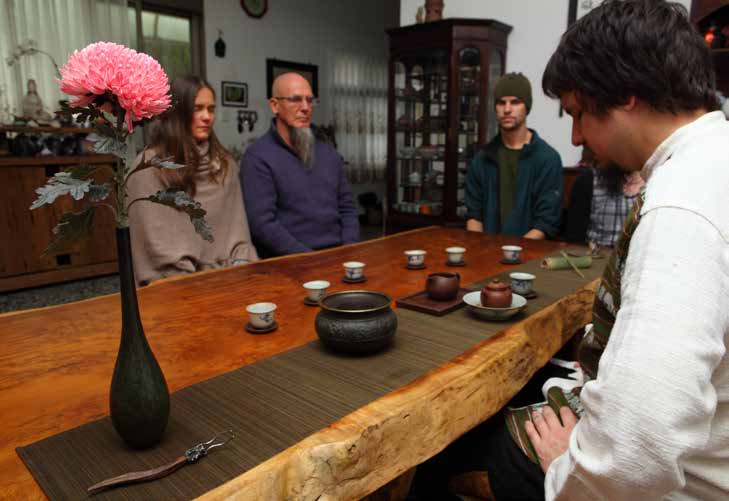
These leaves are earth, soil and rock, wind and water. Through them we drink in the weather. And they are also an expression of what is beyond our planet, absorbing sun, moon and starlight in photosynthesis. Plants don't have a feeling of separation or disconnection from their environment: they breathe in and out, take in the rain and sun, minerals and energy. It all flows through them, open in the receiving and the giving alike. Plants are a part of their environment, connecting completely to the Life that surrounds them. Tea offers us this connection, for we too are a part of this Earth and grew out of it just as it has. As we drink in this herb, the boundaries between outside and in grow fuzzy: at first the tea isn't us, then it is...
We drink tea to revive the connections we have with the Earth and Sky. Tea speaks to us of our own origins in the water and rock, minerals and plants. Without the trees, we would have no food to eat or air to breathe. They are as necessary to our existence as any other aspect of our bodies. And we are related to them in the most intimate ways, as we breathe their air, eat their sustenance and absorb them into our bodies, minds and souls. We must learn to once again feel our dependency on Nature, as our ancestors did. Many people nowadays rarely feel, in their everyday consciousness, just how dependent we are on plants.
Tea is one of the plant kingdom's teachers: a connecter to the source that was grown out of the Earth as a guide for us. It speaks a language from a deeper and far older world than the human one we inhabit now.
Tea is Nature in the simplest sense, as it comes from the mountains - away from the city and its noise. There is an old Chinese saying, "Tea brings Nature to society." It is all too easy to disconnect tea from Nature, drinking it in some fine tea house in the middle of the city. But what would Tea tell you if you connect to Nature through it and the leaves themselves were produced in a way that harms the Earth? Would it cry for help?
It is no longer possible for us to ignore provenance as an aspect of our collective value system. The way something is produced and where it comes from are now just as important in evaluating it as how much pleasure it brings. A high-quality tea must therefore be produced sustainably and organically; it isn't enough that it taste nice. We drink tea as a part of the Natural cycle from weather to rock, seed to sapling, sky to leaves. We enter into that Nature-process and find ourselves. For that reason, it's important that tea be respected as more than leaves. It is a tree, and each tree has a soul - a unique beingness we should converse with rather than trying to domineer to suit our taste.
Tea is also Nature in the greater, transcendent sense: The doorway to existence itself. Tea is Nature, as all of Nature went into its creation - without the sun, sky, earth or stars there wouldn't be any tea to speak of. It touches the Dao, and drinking it is often a returning. Our words, however, cannot intrude upon such a sense of completion.
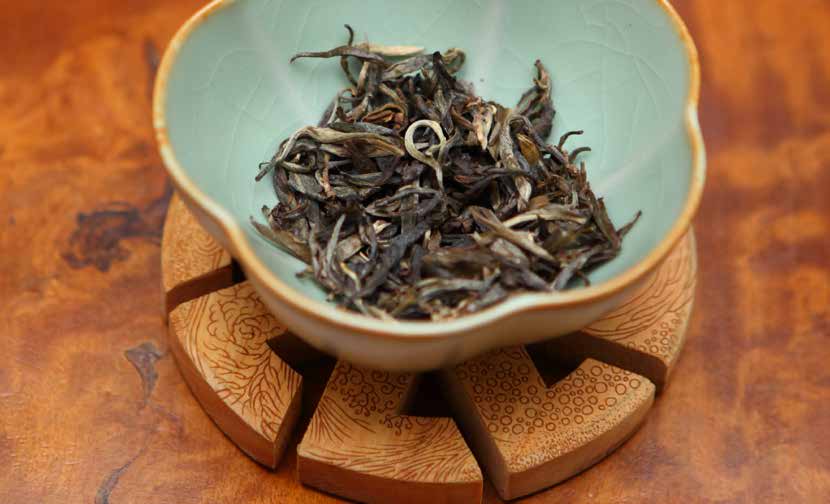
Learning to revere tea as medicine is important to us. Tea is a great healer, of body, mind and spirit. The earliest encyclopedia of Chinese herbs to mention tea stated that it "brightens the eyes." This is a powerful expression of why Shen Nong, the father of all Chinese medicine, called it the "King of All Medicinal Herbs." The eyes are brightened when the soul is in harmony with the body.
Tea is 'medicine' in the Native American sense of the word: that which aligns and connects us with the world and all life. Medicine empowers us in our connection to the Earth and all life on it. Health of body, mind and spirit succor such harmony and arise from it. Health is very much akin to harmony. When the body functions in harmony, internally and externally, it is healthy. The same could be said for the mind and spirit as well. In other words, if you have problems drink tea; if you don't... drink tea!
There is a dimension of experience where people can indeed communicate with plants - one that was utilized by our ancestors for millions of years. The knowledge learned from the plants helps align us with the Sacredness of this Earth and our own place in it. Such wisdom heals more than the individual; it also can help us restructure our societies in a sustainable, healthy way instead of endangering all life on this planet as we are doing now through our discordance.
Tea is adaptagenic, helping alleviate any and all ailments. Living teas have a way of finding and treating any of our ailments, whether they are physical or spiritual. Furthermore, most herbs are useful to treat a particular disease and unhealthy if you don't have that illness, whereas tea can be used every day. It isn't just adaptagenic in our bodies either; it suits the spirit of any occasion. There is an old saying that it is "curious that a teapot can suggest both great and comfortable solitariness as well as friendship and society." Tea has a way of suiting the energy of any gathering, from deep stillness to great celebration.
In this tradition, we cultivate a respect for tea as a healer. The specifics aren't important. While scientists are finding that tea prevents cancer and helps regulate blood pressure, etc., this isn't what we are referring to when we call tea medicine. Tea is more than What Tea Is just a supplement taken for health benefits. Tea heals. While tea might aid your blood pressure, that isn't the end - or even the essence - of its healing powers. It heals more fundamentally - cosmically, you might say. It can realign us with our source. You drink a few bowls and as the great tea poet Lu Tong says, "The last needn't be drunk, for I am swept up to the land of immortals." Even amidst the bustle of the city, tea can transport us to a healing space.

Tea is a spiritual path, a Dao. In living a life of tea we realize that in all we do, we are preparing tea. What we eat affects our tea, as does the way we treat people. One of our masters always says, "If you want to learn to make tea, you must first learn to be a person." That's easier said than done.
Rikyu left us four virtues of tea: Reverence, Purity, Tranquility and Harmony. They form the basis of any tea practice. We must cultivate a reverence for tea, for our guests and ourselves, our teaware and tea space. We consummate this respect by purifying ourselves, our instruments and our space - for they are truly sacred. A purified space leads to tranquility, within and without. And when we are tranquil, we find a sense of completion, presence. Nothing is missing from this moment. In this way, these four virtues steep seamlessly into one liquor. A single draught of such an elixir can be transformative.
Tea is a reverence for the ordinary moment: the grains in wood or stone, the sunlight illuminating a stream of incense, or the steam from a bowl... It is about finding the sacred in everything, every moment of our lives. As we brew tea with reverence, we are purified; and the more purified we become the more we can brew tea with reverence. Tranquility and harmony are also cultivated within and without. First, we practice outer quietude in order to meet the more powerful inner stillness. When we rest in stillness, it no longer matters that there is turbulence around us. We could then brew tea downtown and still experience and share peace with others.
They say that the Way of Tea is 80% cleaning - inner and outer. We work on purifying our hearts in order to make purer tea, the kind that transports people, heals them and connects them to Nature. This requires humility, purity, a mindful, meditative mind and other wholesome qualities. The student asked his master how to brush the perfect scroll of calligraphy and the master responded, "Perfect yourself and paint naturally!" In that way, we live our Zen-mind in our tea. We perfect ourselves and brew naturally. Our wisdom is then communicated to the world through our tea, which speaks louder than any words ever could, and much more directly as well.
The most important element in fine tea isn't the teaware, water or charcoal; it isn't even the leaves. It is, rather, the mind of the one brewing. Some of our best, most transformative tea sessions were held in simple surroundings and the tea was nothing to speak of - simple green tea brewed in a cracked, old bowl. Other times you find very expensive teas in elegant surroundings ruined by a lot of ego trumpeting, while the tea is unfortunately neglected. When tea is offered and received pure-heartedly, magic happens.
Living tea is a leaf grown sustainably and ecologically, full of the Qi of the Earth. It is also what we do with that energy once it has been consumed. After conversing with our master, the Leaf, what we have learned and how we apply that wisdom are important determiners of progress. If we do not heed Her wisdom, She may turn her back on us. We must learn to follow her lifeways, living and beaming the spirit of tea. This is to say that the reverence, purity, tranquility and harmony didn't come from Rikyu - he just named them. They are inherent qualities of Tea itself. Rikyu learned them from Tea, just as we must. In fulfilling such qualities in our lives, we live the energy of Tea itself - we become an expression of tea spirit.
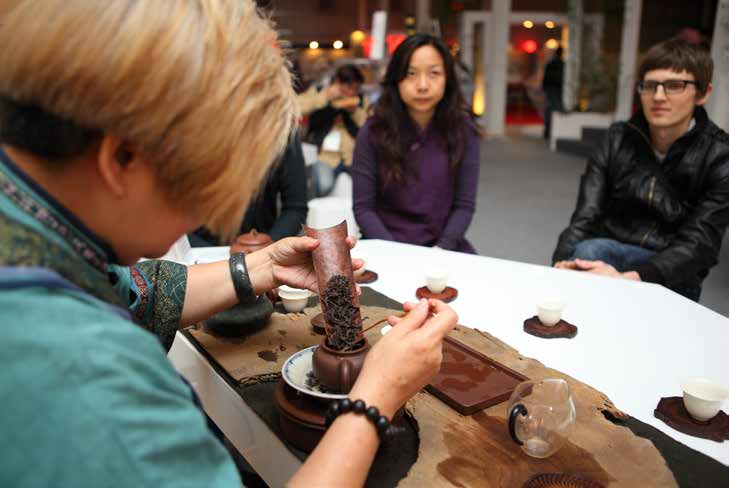
Tea has always been the emblem of civilization and peace. "Through tea make friends" is an old proverb expressing the sentiments we share with tea. Tea isn't always deep and transcendent; it is sometimes a time/space of calm joy, where we can celebrate old friends and make new ones. Tea relaxes us and frees us of the egoic discourse we usually have. Calm and joyful, we can leave our egos at the door with our shoes. In the first ever book on tea, the tea sage Lu Yu wrote that having tea each morning was the only time of day that he could be certain the emperor himself was doing the same thing. In Japan, the tea room was the only place people of different classes and stations could meet and interact free from all social constrictions. And having set down all our masks, through tea, people reveal themselves - open up and make lifelong connections.
In the tea space, we are all ordained. There is no class, title or rank. We are all pure and free, which allows us to talk amicably. Tea has connected people, cultures and countries for centuries. Lu Yu also said that the true man of tea never turns down an invitation to tea. Even if our enemy invites us to tea, we go knowing that this might just be the perfect opportunity to make peace.
In this day and age, we often forget the importance of the simpler gifts: a bowl of tea, a deep listenThe Essence of Tea ing to our fellow human or perhaps even a real look into each other's eyes. No gadget can ever take the place of real human connection. Sharing time over tea is a tremendous opportunity to connect to those we love. Tea is a peaceful state where friendships blossom or are deepened, and preparing tea is itself an expression of friendship.
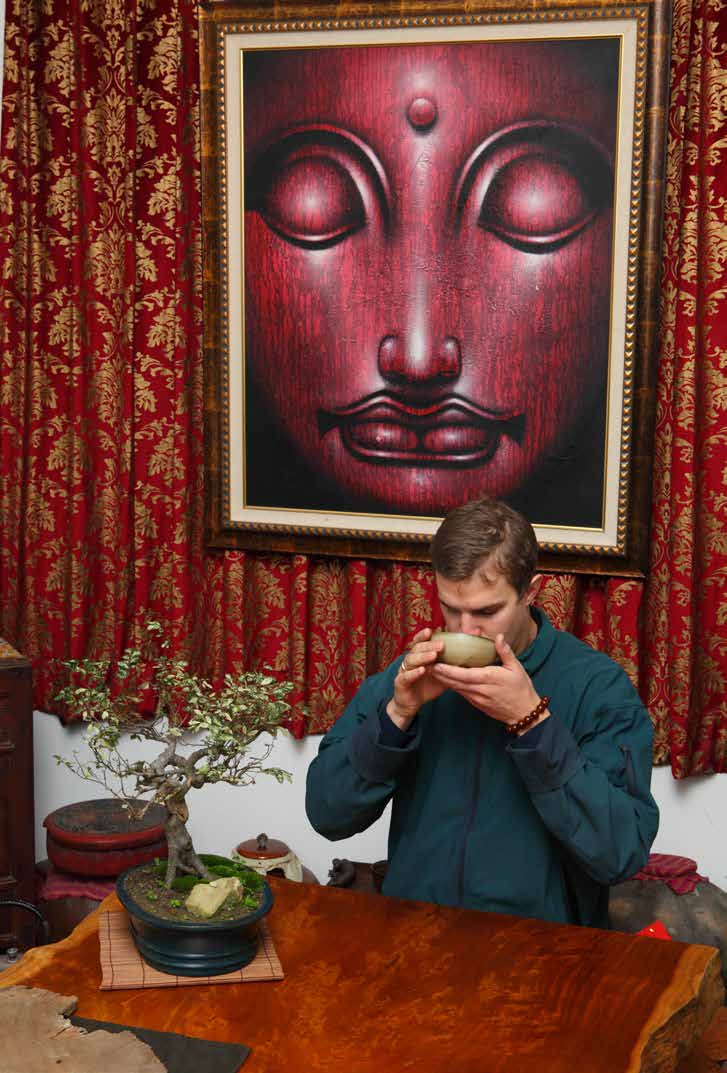
There is no mastery in self-service. In this tradition we don't learn to make tea but to serve tea. True mastery must be in the service of mankind. As we progress, we come to understand that we serve the evolution of consciousness itself, and that the growth and awakening is an impersonal process - the natural movement of the light into life. In offering tea, we offer our spirit in true kinship. All movement into the sacred realm is an effort to bring back boons that will support our community.
When you serve tea to another with a pure heart, there is an opportunity to give a time and space of healing. In such an opening, people are often transformed. Nothing could be more important. In a troubled time, and facing an uncertain future, it is only the evolution of human consciousness that will save our species. This Earth doesn't have environmental problems, nor does it have climate problems; it has human problems. And the human problems are not solvable politically or economically, for they are problems of the heart. If there is to be a medicine, it must also be for the heart.
Tea connects very different people. We set up roadside tea blankets and serve tea to passersby, offering them some presence and loving-kindness in a bowl. It is surprising how dramatic an effect kicking off their shoes and sitting on the ground for a bowl or two can have on someone's day. To truly understand something you must get involved - comprehension comes through participation. To understand tea, set up at the park or market, road or temple and serve tea as an act of kindness. In such a moment, guest and host vanish and we find the oneness that we're all grounded in: the light that shines from within.